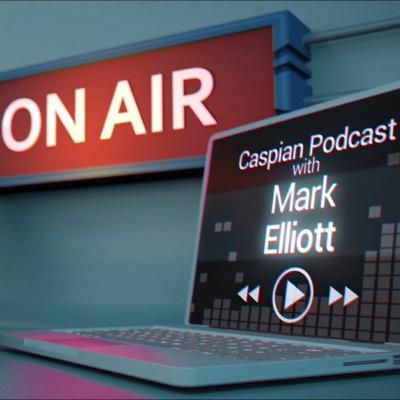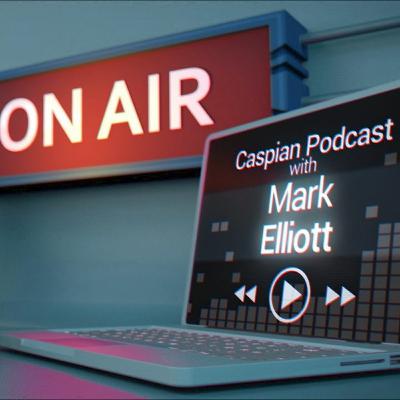Discover Caspian Podcast
Caspian Podcast

25 Episodes
Reverse
If you thought diplomats had to leave their personalities behind to do their jobs, think again. Elin Suleymanov is Azerbaijan’s current ambassador in the UK. Before that he spent a decade as Baku’s main man in Washington, becoming probably the only ambassador to have appeared on Comedy Central. There’s plenty of humour in this very human yet incisive podcast conversation, but much to think about as Mark asks Elin about “caviar diplomacy,” Armenian detainees and hopes for longer term peace in the Caucasus.
Armenian-American analyst Richard Giragosian is the founder of the Regional Studies Center - an independent geopolitical think tank based in Yerevan. He’s a frequent contributor to global news networks, newspapers and periodicals. Before moving to Armenia a decade and a half ago he had been a staffer in the US congress and a lecturer to the US Special Forces. In this eloquent podcast, Richard suggests that, in the Caucasus, there is a clear window of opportunity for reframing decades of conflict. He gives insights as to how Azerbaijan might better understand Armenian viewpoints and how Armenia itself could benefit from greater diversity.
Though Armenians and Azerbaijanis were often friends and neighbours during the Soviet period, since independence – and the two Karabakh wars – contact between the two peoples has been sadly lacking. And that has made it easy for each side to dehumanize and demonize the other. Whether online or in person, contact and discussion between everyday Azerbaijanis and Armenians could help to slowly reverse this process and bring about the conditions needed for lasting peace. That’s the philosophy behind Bright Garden Voices, whose co-founder, Arnold Alahverdian, joins Mark on this edition of the Caspian Podcast.
Episode 22 | Ramin Jabbarli - researcher and teacher born to an Azerbaijani-Turkish family in Iran by Mark Elliott
Polina Dessiatnichenko (https://polinadessi.com) is a Ukrainian-Canadian ethnomusicologist and player of the 11-stringed tar, an archetypally Caucasian musical instruments typically used to accompany Azerbaijani mugham. In this unique edition of the Caspian Podcast Polina explains with demonstrations various musical motifs with which tar players build up the structure of that Unesco-listed form of very traditional yet partly improvised music. Polina also explains a little about the linkages between mugham and ghazal poetry and reveals that learning these art forms is an all-encompassing spiritual endeavour rather like becoming the devotee of a guru.
If you’ve read her article at caspianpost.com, you might feel that you already know Dr. Darya Hodaei – a Florida-based Azerbaijani-Turk from Iran who is the brains behind the language website EnglishAzerbaijani. On top of her day job as a pharmacist and the pressures of motherhood, she has written three bi-lingual children’s books to promote the Azerbaijani Turkic language and culture. In this podcast we get to know her a little better and hear more about her passion for her native language.
The podcast welcomes back prominent Iran-analyst Alex Vatanka, senior fellow at the Middle Eastern Institute. Alex gives a remarkably insightful explanation of the recent Iran-Azerbaijan spat, the perceived role of Israel in the dispute and the background – both historical and political –predicting that it is highly unlikely that the two countries will push their verbal fisticuffs towards a more physical conflict. He also suggests very practical measures that Tehran could take to radically improve its geopolitical situation, should the country find the will.
John Spencer is the chair of urban warfare studies at MWI (the Modern War Institute) at West Point – America’s top Military Academy. Here he talks about the 2020 2nd Karabakh War and why it has students of military tactics re-thinking the nature of modern warfare. John’s particular interest is the Battle of Shusha, the conflict’s dramatic culmination and pivotal victory. The battle, he explains, underlines the continued key importance of strategic cities in winning a campaign.
For further information, read John’s influential article on the battle here and a longer July 2021 discussion on the campaign here. John’s excellent series of regular podcasts on urban warfare can be found here.
As a Brussels-based analyst of EU, Turkish and ex-Soviet affairs, Amanda combines a wealth of experience with access to many of the region’s decision-makers. In this wide-ranging chat, she outlines the role of the EPC, separates fact from fiction in the EU hopes of the Associated Trio (Georgia, Moldova and Ukraine) and discusses the perception of pro-Armenian bias in parts of Europe.
James Ker-Lindsay is a British professor of international relations whose studies focus on peace and security issues. He teaches courses on conflict resolution and is an occasional advisor to the British foreign office. However, he is probably best known for his YouTube channel, which provides clear, easily digestible, yet in-depth backgrounds to a wide range of the world’s unsolved conflicts, quasi-nations and new states. Though his presentations span the globe, his main region of expertise is Southeast Europe, notably the Balkans and Cyprus. In today’s podcast, he makes some fascinating comparisons between conflicts in that zone and those in the Caspian region and points out key ramifications of geopolitical lessons that have been learned.
‘Historian of the present’ Tom de Waal is one of the best known writers on recent conflicts in Caucasus. With nearly 3 decades of experience, his many personal visits as well as his wide range of friends and colleagues on all sides have helped him present unusually clear-sighted overviews of a multiplicity of viewpoints, even if his lack of bias sometimes leads to his being attacked from every direction. That’s especially recently in the era of social media, which he describes as being ‘perfectly designed for people with poisonous intentions’. In this podcast he recalls some of the practicalities that allowed him to research his books first hand, including crossing a minefield clutching a suitcase. Reflecting on Karabakh he calls for trust-building and a non-hubristic response from Azerbaijan after their victory in the 2020 war, and gives insights into the possible motives of Russia in providing peace-keepers.
Visiting Azerbaijan in 1997, Gwen Burchell witnessed the heartbreaking state of disadvantaged children who had the misfortune to be languishing in institutions that had been chronically underfunded since the collapse of the USSR. With a token £500 donated by friends and family, she decided she would have to do something to improve these children’s lives. The charity she started has since grown into one of the most influential in its sector, contributing enormously to thousands of lives. On the Caspian Podcast, Gwen talks about her remarkable life’s journey including her meetings with both the Queen of England and (now President of Azerbaijan) Ilham Aliyev.
This week Mark is in conversation with Teresa Hamlin whose company, Azerbaijani Socks (www.azerbaijanisocks.com) has re-invigorated a traditional Caucasian craft. Far lesser known than carpet weaving, the knitting of slipper-socks in mountainous regions has long been part of village life with distinctive designs that vary regionally. The company now ships worldwide allowing previously low-income rural families to improve their lifestyles and – in some cases – fund access to higher education for their children. To browse or buy the socks visit www.etsy.com/shop/azerbaijanisocks
Swedish Eurasia specialist Svante Cornell gives many fascinating insights into long term developments in Georgia, Karabakh and post-Karimov Central Asia, along with his thoughts on Russia’s wide-ranging ‘geopolitical toolbox’. You might be interested to compare his views on Uzbekistan’s recent evolution with those of Uzbek journalist Shahida Tulanganova on one of our earlier podcasts.
Svante is the author/editor of numerous books and articles about the Caspian Region including Azerbaijan Since Independence, The Guns of August 2008, Uzbekistan's New Face and The Long Game on the Silk Road: US and EU Strategy for Central Asia and the Caucasus. He is the director and co-founder of the Institute for Security and Development Policy and also director of the Central Asia-Caucasus Institute & Silk Road Studies Program.
Founder-director of Azerbaijan-based renewable energy company Provitaz (https://www.provitaz.com), Knut is a Norwegian entrepreneur who speaks Azerbaijani and has lived in the country’s southern Talysh region for most of the last decade. Here he talks to Mark Elliott about the promise of solar power in Azerbaijan, describes some inspiring recent projects and enthuses about the remarkable warmth of Talysh hospitality.
Tehran-born, DC based analyst Alex Vatanka sketches several historic landmarks in Iran’s 20th century geo-political history while giving nuanced background to popular conspiracy theories. He puts into context many personal recollections of Iran as remembered by interviewer Mark Elliott from his years of backpacking in the region, and concludes by assessing the likelihood of Iran and the US reaching an agreement on nuclear and sanctions issues at the on-going Vienna talks that aim to revive the 2015 JCPOA.
UK-based Uzbek journalist, producer and director Shahida Tulaganova sends the world a powerful wake-up call about a potential ‘water war’ brewing in Central Asia. She reflects on other political developments in the region and looks back over some of the reasons why she herself has considered it unwise to return to her native Uzbekistan – mainly due to her daring reporting in the aftermath of the 2005 Andijan Massacre (https://en.wikipedia.org/wiki/2005_Andijan_Massacre), fascinating footage from which can be seen on YouTube (https://www.youtube.com/watch?v=thdWPvxMyyk).
Founding-editor of Experience Azerbaijan (https://azerbaijan.travel/publications-azerbaijan) and former editor of Visions of Azerbaijan (http://www.visions.az/en/), British-born Tom Marsden has lived in Baku for seven years during which time he’s travelled to every corner of Azerbaijan in search of interesting cultural tales to tell. His photographic work has been exhibited in international exhibitions and he is the presenter of a new podcast series on behalf of the Azerbaijan Tourism Board (https://www.tourismboard.az).
Mark apologises about the podcast's previous male dominance to Zumrud (Zuma) Jalilova, an eloquent UK based Azerbaijani scholar of both international relations and gender studies (https://www.facebook.com/groups/gendertalks). Zuma clarifies some of the myths about feminism in a Caspian context, and gives a clear, up-beat vision of some positive steps that can help society strive for greater equality. Note that the excellent short film discussed in the conversation is İkinci Güllə (The Second Bullet), viewable on Youtube at https://www.youtube.com/watch?v=rYjFxkeTD50. Zuma's wide-ranging article about the portrayal of gender roles in Azerbaijani cinema can be found here: http://www.contemporarysee.org/en/Jalilova.
This week Mark Elliott is joined by Matthew Bryza, former US Ambassador to Azerbaijan. Matthew reveals that, despite all the responsibilities, being ambassador was the 'most fun' job he ever had. He gives fascinating insights into his work with the (OSCE) Minsk group, and hints at how much behind-the-scenes work had gone into solving the Nagorno-Karabakh issue before the 'Madrid Principles' were rejected by Armenia. Regarding the post-war situation, he remains upbeat about possibilities of maintaining peace and for working towards greater Caucasian harmony in the future.













